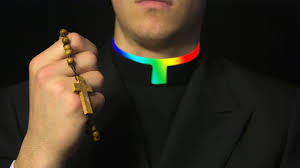Andrew Sullivan has a long article in New York, “The Gay Church.” For Sullivan, it is a temperate and reasonable article.
He points out the contradiction between a church which supposedly excludes gays from the priesthood but has a clergy, including bishops and cardinals, taht is substantially gay — estimates range from 15% to 60%, with the best estimates about 30-40% in diocesan clergy and mush higher in religious orders.
Sullivan defends gay priests from attack, but he admits there are problems,.
“to decouple the sexual-abuse crisis entirely from the question of gay priests is a willful avoidance of an ugly truth. Pedophilia is a separate category outside the question of sexual orientation. But some abuse of male teens and young adults, as well as abuse of other priests, is clearly related to homosexuality gone horribly astray — and around a quarter of the reported cases involve 15- to 17-year-old victims.”
Sullivan knows that gay priests, like straight priests, sometimes fail and violate celibacy in non-abusive relationships. That is a sin that can be repented of and forgiven, but it creates a further problem:
“a poisonous kind of omertà took hold, the priesthood acting as a forum of mutually assured destruction. Since many fellow priests know about each other’s sexuality and/or lapses, they all have the ability to blackmail one another. Mundane failings — like a brief affair — can become easily blurred with profound evils like child abuse. If you expose a child molester to his superior, for example, he might expose your own homosexuality and destroy your career.
This dynamic has made the clerical closet — not the fact of gay priests but the way that fact has been hidden — a core mechanism for tolerating and enabling abuse. On top of all this, the vow of obedience to superiors gives gay bishops and cardinals huge sway over their priestly flock. Some, of course, realized this power could be leveraged for sex and abused it.
Sullivan’s solution is that gay priests should be honest and publicly admit their gayness and either leave the priesthood or reaffirm their intention to be chaste and celibate.
“A third option would simply encourage an end to the clerical closet, which is to say, ask all priests to obey one of the Ten Commandments: not to lie about themselves. It would require gay priests to identify as such to their superiors and parishioners and, in clearing the air, make a renewed public vow of celibacy. (Whether celibacy is healthy for the church is its own question, one oddly distinct from the current crisis; a relaxation of the rules wouldn’t in itself resolve the church’s position on homosexuality, and an embrace of homosexuality is compatible with a celibate priesthood.) Encouraging an end to the closet would underline the distinction the church formally makes between homosexual identity and homosexual acts. It would deter disturbed closet cases from entering the priesthood and provide priestly role models for gay Catholics who find themselves called to celibacy. Those gay priests who refused to be fully transparent could leave. Cardinals and bishops and directors of seminaries could insist on frank discourse on the matter. Double lives would become far less common. If a priest is committed to celibacy and doing a good job, why is his public gayness a problem?”
A good question. What would be the effect if it were publicly acknowledged that a third of Catholic priests were gay, but they were leading chaste lives? One problem is the identification of gayness with lack of masculinity. This is not true; but the type of gays who tend to become priests are not the biker or rugby types. Straight men who are not very masculine are also a problem. The Western churches have long repelled men who desire to be masculine, and a further identification of the clergy as non-masculine would not help.
I respect gay priests who are sincere in their intention to be celibate. But the corruption in the Church creates an environment which is dangerous to such priests. Seminarians are subjected to an environment like that of classical pederasty, in which older priests become mentors and predators of young men. Once compromised, a seminarian or a priest is vulnerable to pressure to have sex and is reluctant to reveal abuse for fear his own failures will become public.
How to deal with this? the key figures are seminary authorities and bishops. If they are compromised, they must be removed, and uncompromised men of integrity put into authority. They will have the wisdom to deal with the problems that both straight and gay priests encounter. However, Francis’ reluctance to examine and deal with the corrupt atmosphere that tolerated, enabled, and promoted McCarrick shows that he is unwilling or unable to deal with the problem. And Francis won’t resign.
Al we can hope for is that the next pope will either deal with the problem, or at least let bishops’ conferences and laity deal with the problem, and not block them, as Francis has done.
